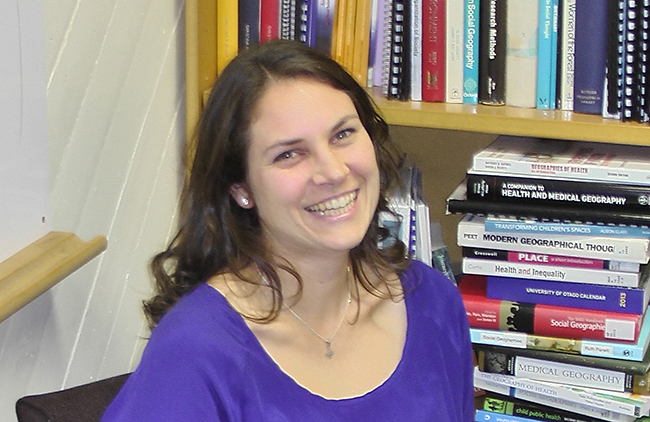Friday 9 November 2018 2:50pm

As the University of Otago reflects on its best Marsden Fund round ever, six Division of Humanities researchers are celebrating after gaining project funding totalling $4 million.
University-wide 41 world-class research projects secured $28.5 million, up from $24 million for 33 projects last year.
Division of Humanities Pro-Vice-Chancellor Professor Tony Ballantyne congratulated recipients Associate Professor Jacob Edmond, Dr Christina Ergler, Professor Merata Kawharu, Dr Karyn Paringatai, Dr Wayne Stephenson and Associate Professor Angela Wanhalla on their success.
Dr Christina Ergler, Department of Geography, Project Title: Pre-schoolers and their cities, Award: $300,000
It is amazing to receive the Marsden Fast-Start grant for our project ‘Pre-schoolers and their cities’ as the project will provide a novel platform for pre-schoolers to share their experiences of using their cities.
Our study addresses the silence of pre-schoolers’ ‘voices’ in cities and we will invite pre-schoolers from different city environments and social backgrounds to express what it means for them to learn, engage and build relationships with their social and physical surroundings.
However, we not only want to provide a platform for ‘listening’ to pre-schoolers, but also translate their use of and experiences in cities into good planning practice. We want to discover how young children of different backgrounds and abilities can best be supported in sharing their experiences and perspectives of living, playing and learning in an urban environment and how this knowledge can be used to support the planning of more inclusive environments.
In doing so, our study will shift current thinking about pre-schoolers’ ability to think about space from ‘spatial accuracy’ to spatial ‘literacy’ which explores their place-based city experiences. Through this process we hope to produce understandings that demand recognition for pre-schoolers as current citizens and knowledgeable meaning-makers for the places they live in.
To our knowledge this will be the first study to systematically shed light on pre-schoolers’ contemporary city use, their experiences, agency and their urban activity spaces by looking at pre-schoolers’ lives in Wellington, Christchurch and Dunedin. So, it is wonderful to receive the grant and be able to work at the forefront of creating new insights into young children’s life worlds.
Listening to and valuing young children’s environmental experiences and perspectives is essential to unsettle adult-centric ways of viewing the city and to support their wellbeing, providing positive citizenship experiences and enabling them to grow up to be socially, mentally and physically healthy.
And this is exactly what we plan to do with our project by co-developing an evaluative framework with planners and urban professionals. The aim of this framework is to develop ways of thinking through and incorporating young children’s use and needs in urban environments in less adult-centric ways by challenging how the needs of young children in city environments are currently planned for when (re)designing cities or spaces within cities.
Geographical research on pre-schoolers’ life worlds is still in its infancy this project will help us to put young children’s profile, and that of children’s geographies in New Zealand locally, nationally and globally more firmly on the map.
Getting this grant would have not been possible without the encouragement and groundwork of the belated Emeritus Professor Anne B. Smith. Anne has inspired and paved the way for us to connect children's rights, research and practice.
Project Summary:
Virtually nothing is known about pre-schoolers’ knowledge and experiences of city life. The UN Convention on the Rights of the Child requires decision makers to listen to children on matters that affect them. Our study asks: What can we learn from pre-schoolers about creating urban environments that work better for them and how can we use this knowledge to inform city planning? We will invite pre-school children living in three New Zealand cities to voice their expertise on living, playing and participating in their city. We contend that given appropriate child focused methods, preschool children have the competence to reflect meaningfully on their experiences, understandings and views of large scale environments, namely their city. To share their insights, four-year-olds will discuss their city lives, build model cities, and use iPads to photographically record their everyday experiential urban encounters. The pre-schoolers’ data will be used to theorise their agency in cities and develop an evaluative framework planners and urban professionals can use to reflect on pre-schoolers’ diverse city use and needs when undertaking urban planning and development projects. This will be the first study to systematically shed light on pre-schoolers contemporary city use, their experiences, agency and their urban activity spaces.
